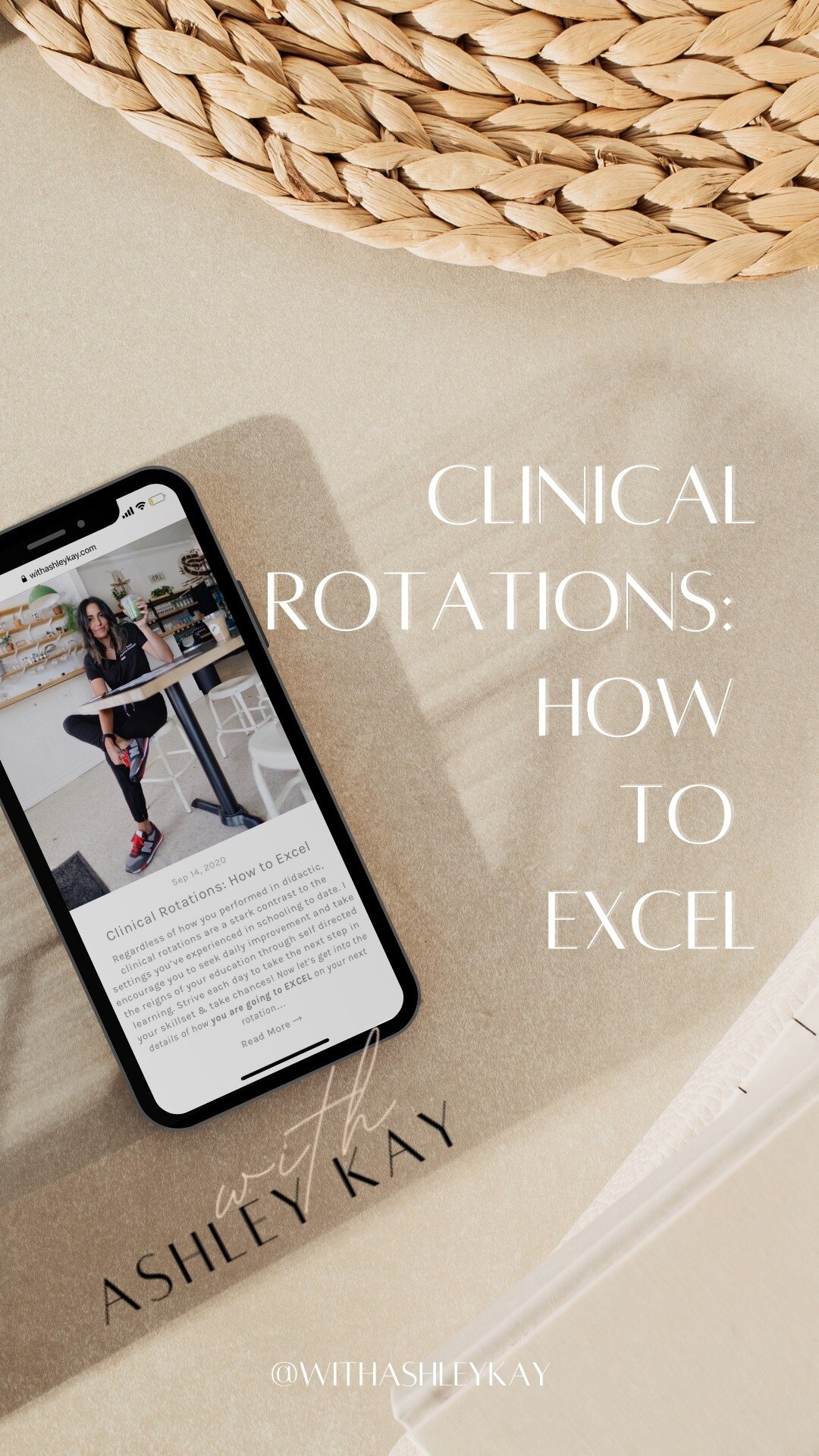Clinical Rotations: How to Excel
hey there!
Hi, I’m Ashley! Thanks for visiting my site— I truly believe balancing our daily hustle is essential to create a life of success that we can’t wait to wake up to each day.
This space is your daily dose of inspiration from skincare + style, to motivation + tips for future med providers.
xx Ashley
keep reading +
TOP 5
the
01.
02.
03.
04.
Our wedding photos
Skincare products worth the splurge
How I chose my Wedding Dress
New PA on the Block, Pt.1
by CATEGORY
what's in my cart
This week
SHOP
downloads
GET THE
shop this
view my 5 fave basic staples
basic staples
TAKE
QUIZ
how healthy is your your work life balance?
the
skin + beauty
body + mind
life + relationships
education
style
05.
top summer picks of '21
shop all my faves +
my
Rotations have begun & I am so excited for you!
HANDS DOWN, MY FAVORITE MOMENTS OF PA SCHOOL HAPPENED HERE- LETS DIVE IN:
Regardless of how you performed in didactic, clinical rotations are a stark contrast to the settings you’ve experienced in schooling to date.
This is your beginning.
A new chapter.
A fresh start.
Clinical rotations will essentially compose the first layer of foundation to the type of provider you’re going to be…Not only for yourself, but your patients + preceptors too. I encourage you to seek daily improvement and take the reigns of your education through self directed learning. Strive each day to take the next step in your skillset & take chances!

Whether you’re placed in outpatient or inpatient medicine – it’s important you continuously set your own goals throughout the clinical year on your rotations.
Unlike didactic where you were tested via several exams per week, you will only have one EOR (end of rotation) exam to keep you accountable for studying and staying on top of your material throughout each specialty. Don’t sleep on this responsibility!
Forget about the way this year is going to be graded and get ready to learn A LOT! The experiences you’re going to gain from clinical rotations are a lot more important (+ useful) than the grades… and as long as you follow the simple pieces of advice below, I know you’ll be sure to crush it !
While you may already know which rotations you’re definitely interested in & the rotations that you already know won’t be of even the slightest of interest…It’s key to remember that this could be your only opportunity to do + see the many tasks that you’ll carry out on rotations without commitment!
Like I said in Part 1 of this series (here): Begin each rotation with an open mind!
Perform as many procedures that will be encompassed within your license as a PA-C —having a foundation of previous experience in various procedures will add to your toolbox (and even your resume) of skills you’ve become proficient in completing as you enter the field as a brand new licensed professional! Every skill set counts when applying to your first position as a newly minted PA-C and could be the tipping factor / advantage when employers consider you for a position next year- take advantage!
So let’s dive in …
1. KNOW YOUR ROLE + WHATS EXPECTED OF YOU:
You’re a student and your purpose is TO LEARN, but at the same time- YOU ARE A GUEST.
Begin each and every rotation by introducing yourself not only your preceptor, but the staff & surrounding providers who will be working in the environment as well. Preface your enthusiasm to learn & offer your willingness to help if needed. This is not only respectful & polite to do, BUT will also set a great tone with the practice… and trust me when I say that making personal connections will only help you in the future & throughout your time as a student.
Before taking initiative of beginning patient interactions and/or your individual learning experience on site, be sure to communicate with your preceptor and clarify what is expected of you first. Establishing these boundaries and knowing your preceptor’s preferences will give you less anxiety & hesitation when trying to determine things like when it’s okay to see patients on your own or knowing the best time to ask questions…
Pro Tip: Be sure to ask during a moment of downtime about attempting or performing emergent procedures like intubating a patient / placing lines / suturing as these occasions often do not have very opportune moments to ask prior to them coming in & being carried out. But if they know ahead of time they’ll be able to guide you if they’re aware you’re interested in being more hands-on.
Wise words from providers on the ‘gram:
@kathleenkusey “Treat every day on site like a job interview”
@taythepsychPA “Even if the rotation isn’t your thing, learn everything you can from it!”
@mfh221 “Introduce yourself to EVERYONE”
@stethoscopeandsparkle: “Day 1 ask what THIS preceptor wants in presentations & do that! It’s so person dependent”
2. SHOW UP READY TO WORK & SHOW UP PREPARED:
It doesn’t matter if the rotation is in an outpatient clinic or inpatient medicine, show up early & show up ready to hit the ground running! You can find my white coat pocket essentials here, but aside from being physically prepared for the day- be mentally prepared as well!
ie: Did you review the most common disease states you’ll be seeing in clinic today? Did you look up the questions that you did not know the answer to when you got pimped yesterday? Does the preceptor expect you to see post-op / pre-op patients prior to beginning the day? If asked to round on patients, would you be able to give the pertinent information needed? (Templates to help you get started with rounding- coming soon! But for now, here’s a SOAP Note that I used for my first rotations)
If you prepare each day similarly, you’ll be ready if/when the situation presents itself & this preparedness will keep you alert and attentive to details you may have otherwise missed. Even better, you’ll be prepared if given the opportunity to jump in- this will help you learn to start thinking ahead of the game and a more efficient provider.
Pro Tip: Bring a pocket sized notebook / blank paper that you can fit in your whitecoat pocket. I even used an old school clipboard for some rotations with blank sheets of computer paper that I would carry. I used this to write down bits of new info or questions that would arise during moments that aren’t appropriate to ask. Don’t assume you can just whip out your iPhone & that every preceptor will be okay with it – & writing out new info will help with your retention, too!
From providers on the gram:
@cocopapciak “be prepared and be attentive, even if the rotation isn’t your favorite, you can always learn something”
@breelance12 “keep a notebook and start writing out medications / dosing, I still use mine daily!”
@lauraluchini_ “when asked to read on a topic, try to anticipate the questions you’ll be asked”
@em_tyree: “when asked to see a patient- be ready to present the patient including the assessment and plan!”
3. YOU SET THE PACE OF YOUR LEARNING & EXPERIENCE
Fully aware that this sounds cliché – but in retrospect, I learned 100x’s more on the rotations when I showed more enthusiasm and stepped out of my comfort zone for the sake of learning more.
When you show up to your site be prepared to get to work! It would be wise to use this time to learn how to efficiently function in the hospital while the burden of patient care is not yours.
Practicing as a licensed provider, you will quickly discover starting the day well begins with an efficient morning.
Whether the specialty you’re rotating in is of interest for your future or not – this is your time to learn! With that being said, ask questions & don’t be afraid to make mistakes – it’s better to be the ‘ambitious student’ now than the ‘unexperienced / timid provider’ later, all because you were too afraid to jump in on opportunities on rotations.
Most of all, it’s important to know that your questions are welcomed regardless of how silly they may feel and have a preceptor who reciprocates the respect & effort knowing that you’re learning – on the same note: be sensitive to the environment in which you ask questions (esp. if you’re on your surgical rotations) & be mindful when asking questions that could be easily found if you looked yourself.
Quite honestly, it doesn’t matter how advanced you may be – as a student on rotations no one thinks you know much of anything – and while this thought could be far from the truth (hear me out, I know you’re smart & capable students )- it should give you huge relief!
What do I mean and why would I say this? Because as a student your job is to learn and as a student you’re also expected to make mistakes through this learning experience.
Clinicals are the last opportunity you’ll have where you’ll be able to perform patient care under someone else’s medical license– therefore, you will never be given a task without a superior to assure you’re either capable or that you won’t cause harm by attempting. In fact, knowing there’s always backup, essentially a security blanket- should make you want to jump in head first and say “yes” to any opportunity that arises and offered by your preceptor.
Note: If you’re genuinely concerned about harming a patient by carrying out a procedure or haven’t performed a new skill on a live patient yet, voice this to your preceptor! Verbalize your enthusiasm and desire to learn, but that you don’t feel comfortable in carrying out the task without supervision. Honesty is ALWAYS preferred over pretending to know what you’re doing !
Of course, each rotation + preceptor will have different expectations and levels of autonomy that they’re willing to let you take lead on – but regardless, you won’t know unless you ask / try !
Don’t forget that having a good attitude and willingness to learn is more important than knowing everything. Obviously it’s critical to do your own studying, but having a ‘teachable’ attitude and taking initiative in your learning will only lead you to a positive rotation experience.
4. NEVER LIE ABOUT AN EXAM FINDING:
I know this sounds ridiculous – but there will be a time when you’re asked a detail regarding your patient encounter involving a physical exam finding, a lab result, etc… and you will not have the answer. Maybe you forgot to ask the patient a question about their history / symptoms or maybe you forgot to check a lab value / perform a small detail of the physical exam…
NEVER MAKE UP AN H&P / PE FINDING
OR REPORT A FINDING THAT YOU DIDN’T PHYSICALLY SEE / DO
Trust me when I say this situation will happen. Sometimes this is a test on the preceptor’s behalf to see if you’re on top of pertinent details and sometimes it will be without any preconceived thought. Either way, just be upfront and honest. Tell them you didn’t ask ‘XYZ’ and that you will go back (if the situation allows) and always be sure to ask the patient ‘XYZ’ next time.
Which leads me to the importance of performing a thorough physical exam. Do this for each patient (even on the patients you know will have normal findings). Eventually performing thorough physical exams will be second nature for you & there will be less of a chance the situation above will occur.
Don’t forget if it’s not documented in the chart- it didn’t happen… and you cannot document anything that you didn’t actually door know to be true regarding your patient encounter in the chart.
I digress…. You get the point: If you make a mistake – own up to it!
Pro Tip: Something I would do personally do ( with some of my preceptors…not all ) was to ask them to discuss and quiz me on a topic/disease process or two per week when there was extra time. Just a 10-15 minute discussion covering a couple disease topics with hypothetical scenarios testing my understanding of the disease. Doing this with them forced me to think through a situation and even kept me accountable for studying as I would prep for them to quiz me on different possible scenarios (because not knowing your material is embarrassing).
From providers on the ‘gram:
@thomps88 ‘Always try to answer a question with an educated guess! answering with “I don’t know” looks terrible!’
5. ACTIVELY READ / STUDY THROUGHOUT YOUR ROTATION:
You will have periods of downtime during the day when your preceptor may have obligations to tend to, personal phone calls to make, or administrative work that won’t need your attention or presence. Be productive with your time while you have these moments – this is where pocket manuals or handbooks are helpful to have available. Unlike textbooks that cover topics thoroughly, there are several helpful pocket sized books that are great to have on hand in your whitecoat for topic review. My personal favorites can be found here
Realistically, you probably won’t have the energy to read big textbooks for hours every night- at least to the extent you did while in didactic. So it’s important you read something, and make it worthwhile… not just information in such detail that you won’t remember 24-48 hours later. This is where “pocket” books and handbooks are helpful.
Be familiar with the diseases/disorders/status affecting the patients you’ll be seeing ahead of time. It will take you making an initiative to get this information, no surgeon or physician is going to go out of their way to make sure you get this- they have so much more going on! Get the information by asking them in advance or, preferably, ask the office staff (in scheduling, MA’s, or front desk staff) to help guide you in finding a tentative schedule for the week or a patient list that they typically stick to.
Once you do this think of possible treatment options, caveats, and/or modifications you would recommend.
(ie. What are post-operative complications to be aware of for the intervention/procedure? What are common side effects of the medications the patient is taking that you should be sure to ask about? What are the recommended screening guidelines for patients their age?)

Focus on reviewing the common disease states (or those you are unfamiliar with) the night prior for mental preparation & to give that small boost of confidence you may need! There’s always a high likelihood you will be asked questions about your existing knowledge on either the disease state or treatment options you would consider. Reviewing the night before is significantly helpful with not only preparation, but to aid in easing your nerves…especially if this is your first rotation and you haven’t examined patients independently yet.
You can find more on preparation tips/advice here on my previous blog post focusing on how to prepare for clinical rotations.
Lastly, if your preceptor doesn’t establish the expectations upfront, offer to! Ask to chart, ask to try and see patients by yourself first & follow up with them after, ask to follow a “see one, do one, teach one” way of learning & emphasize your excitement to learn new procedures!
– SURGICAL RESOURCES: When it comes to surgery, find a surgical atlas/text to briefly look over before surgical cases. I recommend checking out Zollinger or Gliedman as these typically involve anatomical pictures of each step to give a visual of what to expect. These books are quite significant in price – so I wouldn’t advise purchasing- instead, check out your hospital or programs library (sometimes the surgeon’s may be willing to let your borrow them, too).
From the providers on the ‘gram:
@drjrutland: “read something for 60 minutes every day”
@lexylauren13 : “read about what you see! If you see something interesting, look it up”
So, do you feel ready? Are you confident with presenting your patients to an attending?
Some Tips with Rounding Duties and Expectations:
– Use THE list to your advantage (referring to the list of patients that I previously recommended you obtain) & mark which patient you’re responsible for rounding on & color code this depending on the completion of their workup.
If you’re responsible for seeing the patients and charting on them solo, be ready to write up a focused consult note, progress note, and post-operative note (if surgical). If you don’t have a pre-made template already, I definitely recommend starting your rotation out with one until this becomes something you can do in the correct order to keep your thought process on track, you can find mine here.
>>> Look up the patient location >>>
>>> check labs overnight >>> go see the patient & assess >>>
>>> ALWAYS SPEAK WITH THE NURSE about patient status / anything eventful to occur overnight >>>
>>> Write it up in the chart & prepare to present to attending
So what kind of information is worth collecting & assessing prior to charting?
– You should obtain as much information regarding your patient as possible before seeing them, a process otherwise known as a “chart biopsy.” This information can be gathered from the patient’s chart/EMR. It’s recommended to start your note as you review this data.
– When you interview the patient you should confirm/deny any pertinent information you have reviewed and direct your questioning and physical exam in accordance with the information you have gathered.
– Remaining unbiased will maximize the educational opportunities when seeing a new patient, when reviewing the chart + focus on the patient’s CC with your list of differential diagnoses in mind. Remember: the goal of every patient encounter is to hone your interviewing skills, create a list of possible differential diagnosis, and create a treatment plan.
– The degree of efficiency on the TEAM relies on is achieved when each member of the team carries out his/her role effectively!
Overall, I hope this post gave you some helpful direction with your rotations!
If there’s any questions, concerns, or confusion from the above information- please don’t hesitate to comment below or contact me via Instagram or email! You can also find additional information and caveats on my feed/stories as well 🙂
As always, I hope you know I’m in your corner- rooting for you & your success…anything I can do to help, please let me know!
Related

Leave a Reply Cancel reply
MAY LOVE
you
CATEGORIES
the
KEEP READING
My favorite tips & tricks and things I've learned on the job.
My go-to rituals & hacks to keep the balance in my hustle.
From my study tricks to my go-to resources, I'm sharing it all.
Sharing what's in my closet, in my cart and on every wishlist.
Navigating life + relationships in every aspect of my life.
These are my absolute favorite, must-have things in every season.
POSTS
POPULAR
THE GOODS
get
all
No one likes getting junk mail + we avoid that at all costs. Dropping in your inbox with ‘you saw it here first’ content, monthly inspo, recaps on recents— all content created with you in mind!
xx AK
I SEND GOOD MAIL. PROMISE.
talking about...
SOCIAL
let's
get
EMAIL ME
KNOW
get
to
®2021 with ashley kay. site by asdc.
back to top
THE GOODS
get
all
No one likes getting junk mail + we avoid that at all costs. Dropping in your inbox with ‘you saw it here first’ content, monthly inspo, recaps on recents— all content created with you in mind!
xx AK



